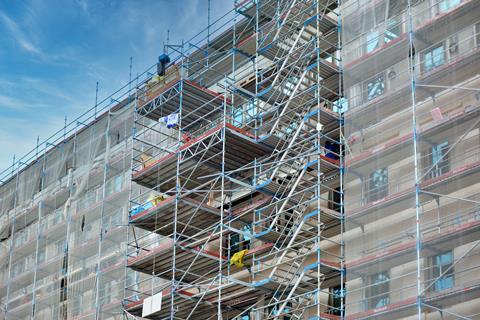MHCLG will work with sector to produce a long-term strategy to fix social housing blocks
The government’s plan to speed up building safety remediation of social housing blocks will not work unless funding and balance sheet capacity in the sector is increased, the G15 group of housing associations has warned.

Angela Rayner yesterday announced the government’s ‘remediation acceleration plan’ with the aim of ensuring buildings in government-funded schemes over 18 metres in height with unsafe cladding are remediated by the end of 2029. It is also aiming for buildings 11 metres and 18 metres to have a date for completion by the same deadline.
Alongside this, the government announced it will work with the sector to produce a long-term strategy to remediate social housing blocks, to be published in the spring.
Fiona Fletcher-Smith, chair of the G15 and chief executive of L&Q, welcomed the move to bring forward a strategy and said the G15 is looking forward to working with the Ministry of Housing Communities and Local Government (MHCLG) to shape it.
However, she said: “Sped up timelines and tighter deadlines cannot be delivered without increased funding and increased sector capacity.
“Resources are needed to ensure even more investment is not diverted away from building new homes for those who need them most.”
Fletcher-Smith called for housing associations to be given equal access to the £5.1bn Building Safety Fund to access grants for remediation work. Under current rules, social landlords are only eligible if costs would otherwise be passed on to leaseholders or they threaten the landlord’s financial viability. She also repeated her call for a ten-year rent settlement and the reintroduction of rent convergence.
Fletcher-Smith’s comments were echoed by the National Housing Federation (NHF).
Victoria Moffett, head of building and fire safety programmes at the NHF, said: “Any long-term plan for the remediation of social housing cannot ignore the critical need for government funding. Housing associations are doing everything they can to make their buildings safe as quickly as possible, however the lack of funding is a critical factor in determining the pace of remediation, and means money is being diverted away from new and existing social homes.
“We will continue to call for equal access to building safety funding and will work closely with the government to make all social housing buildings safe as quickly as possible.”
Under the wider remediation acceleration plan announced yesterday, the government said it will create a legal obligation for landlords to remediate unsafe cladding backed up with “severe penalties”. It also pledged to give regulators new powers and funding to enforce remediation; to speed up the progress of buildings in government-funded schemes by reducing the time from application to works starting on site and to empower metro mayors to drive remediation in local areas.
According to the MHCLG, a total of 29 developers have also committed to doubling the rate at which they fix the buildings they are responsible for under a new joint action plan.
>>See also: Grenfell: a tale of systemic failures
Rachael Williamson, interim director of policy, communications and external affairs at Chartered Institute of Housing said: “The government’s remediation acceleration plan is a welcome step towards tackling the unacceptable delays in making homes safe. Setting clear deadlines and strengthening enforcement will provide much-needed clarity and accountability.
“However, progress must be matched by sufficient resources and a strong focus on resident safety and well-being.”
According to MHCLG, 4,384 buildings have been identified as having unsafe cladding, with remediation completed on 1,436.
Angela Rayner said yesterday that the pace of remediation “has been far too slow for far too long.”
She said: “We are taking decisive action to right this wrong and make homes safe.”










No comments yet